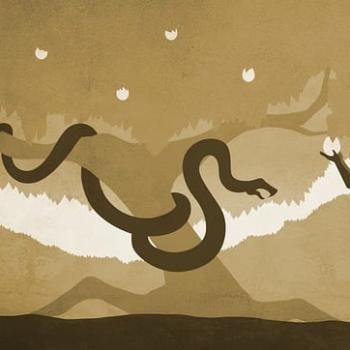Other people are motivated by the promise of reward, and so Matthew emphasizes that obedience leads to reward (Mt. 5:12; 6:2-4; 25:1-30, 31-46). I noticed, in looking at a concordance, that Matthew mentions the rewards of righteousness four times more often than Luke. The parable ends by promising that the righteous will "shine like the sun in the kingdom of their Father" (13:43).
For both groups in his community, Jewish Christians and Gentiles, the temptation is to try to get by on lip service without putting one's life on the line. The motivation for this ploy differs, but the result is the same: inactivity. Jewish Christians were resting on the laurels of their heritage, feeling they didn't need to do much. Gentile Christians were reveling in their freedom from the law, feeling they didn't need to do much. Matthew's Jesus calls Jewish and Gentile Christians alike to a righteousness that exceeds that of the scribes and Pharisees (5:20).
So perhaps the parable is an attempt by Matthew to answer the question: How do you motivate people who enthusiastically call Jesus "Lord, Lord," but refuse to follow his ethical teachings (7:21-27; 13:47-50; 22:11-14)?
Perhaps it's his attempt to answer the question: How are two groups to coexist productively and peacefully when each refuses to forbear and forgive the other, but instead excuses their own behavior while judging that of others?
It can't be a coincidence that Matthew's gospel, along with its insistence on active obedience to Jesus, also highlights the need for compassion and forgiveness. Matthew's is the only gospel to include the parable of the Unmerciful Servant (Mt 18:23-24). Our unwillingness to forgive others blocks our ability to receive divine forgiveness.
Says commentator Donald Senior,
This parable urges restraint and tolerance on the part of the community, a stance that harmonizes with Matthew's strong emphasis on not judging and on seeking reconciliation, even with an enemy (5:21-26, 43-48; 7:1-5). God, not human agency, will deal in a decisive way with iniquity. In the meantime, the community should be aware of evil in its midst but not be compelled to uproot or destroy it. (Senior, 153)
Hare points out that the allegorical interpretation of the weeds and wheat omits one of the key features of the parable: its emphasis on the landowner's forebearance. What was central to the parable was ignored in the allegorical interpretation. Concludes Hare, "Perhaps Matthew was less pleased than Jesus with God's long suffering" (Hare, 155).
The Parable of the Weeds and the Wheat in Evaluating our Lives Today
Some weeds need to be plucked up, the sooner the better
The parable does not mean that, rather than avoiding negative experiences in life, we are to seek out discordant sounds, funky smells, unpleasant situations and difficult people. An unjust ruler needs to be opposed. A bad habit that hurts ourselves and others needs healing.
Clearly, there are some weeds that need plucking. The sooner the better. If something smells in my fridge, I clean out the whole thing to find the culprit: the moldy lemon in the back of the produce drawer. When I'm baking snicker doodles and I accidentally toss in chili powder thinking it's cinnamon, I scoop it out ASAP before the flavor is ruined.
Appreciating the Weeds in our Lives
The parable of the weeds and the wheat has similar themes to the parables of the mustard seed and yeast that follow it in Matthew's gospel. Mustard seeds and yeast appear small and insignificant, but have big results. Leaven was thought of as an agent of corruption in the ancient world and yet it helps the nourishing loaf expand. Weeds seem dispensable, but their removal destroys the wheat. "Things are seldom as they seem. Skim milk masquerades as cream," Buttercup sings to Captain Corcoran in Gilbert and Sullivan's comic opera "HMS Pinafore." In this parable, it's more like cream masquerading as skim milk. We can't do without the weeds. What the weeds in your life?
In a recent novel called The Gap Year, by Sarah Bird, a mother, Cam, worries about her teenage daughter, Aubrey, who is about to go off to college:
Because I didn't expose my only child to enough dirt, she will hit the germ factory that is a college dorm with a weak immune system. And she will die of spinal meningitis.... Although I am a slob and raised Aubrey with plenty of messiness, my worst enemy- Recent Studies- now tells me that I should have gone the extra step and provided actual squalor.... If only I'd put a goat in the playpen with my baby she probably wouldn't have asthma today.
This parable is primarily about relationships between people. It's about not judging and not assuming that you and I are wheat and others are weeds. When we judge others and dismiss their contributions and value, we become weeds among the community's wheat.





